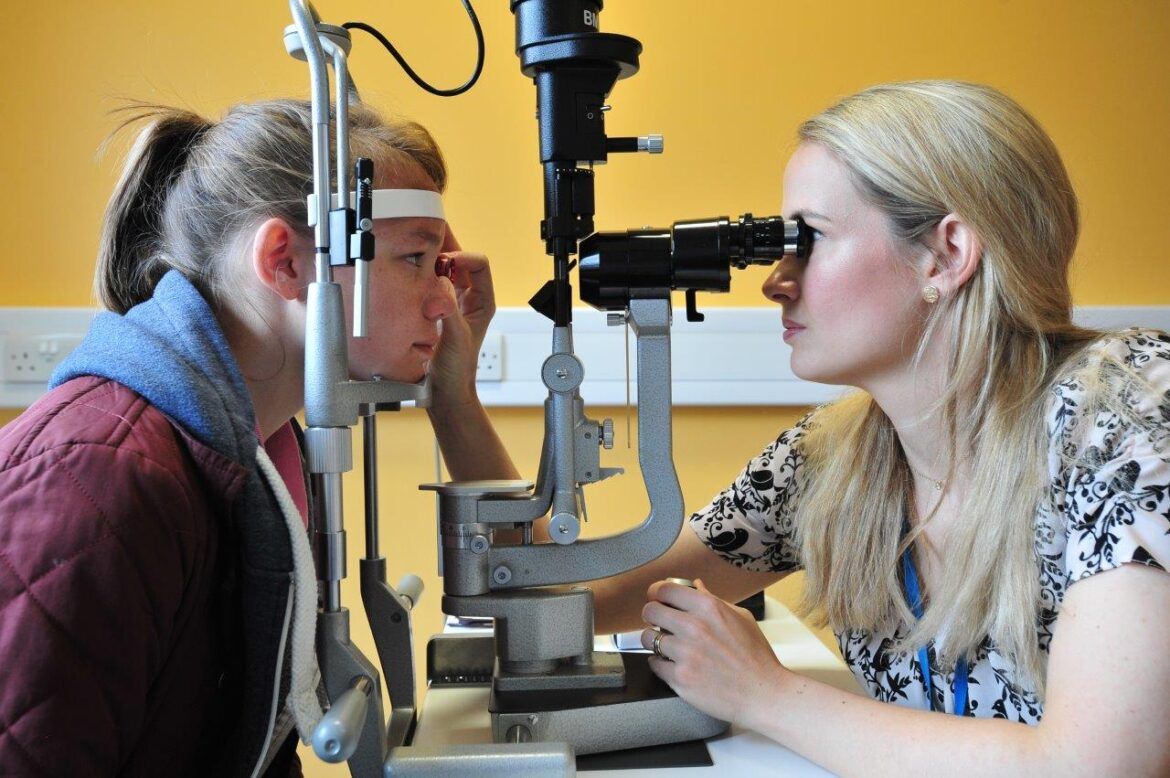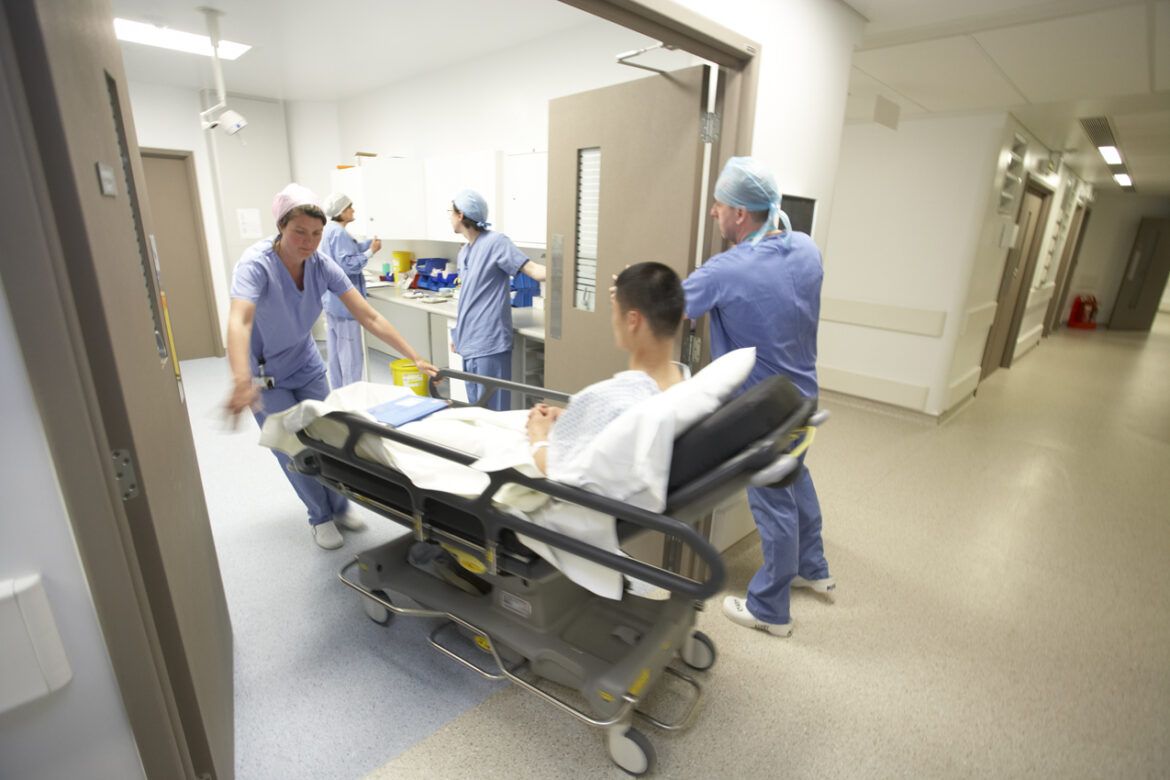UCLPartners 2027
Life-changing innovation for better health and care
Foreword
by Dr Chris Laing
CEO of UCLPartners

We are embarking in a new strategic direction, one where we will work in partnership to drive research and innovation that solves the biggest health challenges facing the five million people living in our communities. Our focus will be to deliver fewer, bigger projects we know can make a life-changing difference at scale.
Since our formation in 2009, we have worked across specialities, professions and organisational boundaries. We have demonstrated an ability to mobilise collaborations of the clinicians, researchers, patients and industry groups required to drive change, and through this we have delivered significant impact. This is our strong foundation, which we can confidently build upon.
We enter this next chapter with renewed purpose and a clear mission as a partnership.

Firstly, we need to strengthen our ability to deliver solutions rapidly. This means strengthening our abilities as a health innovation partnership. We will be working to increase organisational and staff capacity to do research and innovation, improve our data systems and strengthen our patient and public involvement. We will strengthen our skills in implementation science, building capability in real-world evaluation of solutions. And we will strive to increase our support to enterprise while ensuring solutions identified are sustainable and generate wealth.
Secondly, we are directing our collective expertise and resources towards tackling the biggest health challenges our local communities are experiencing. These challenges of cardiovascular health, adolescent mental health, cancer detection, vision loss, respiratory health and dementia are not unique to our demographic; the devastating impact they have on people’s lives are felt across the globe meaning that whatever home solutions we find will have international relevance.

This strategy has been developed by drawing on the views of our NHS and academic partners, regional and national stakeholders, members of our local communities and our staff. It has been informed by insights from our local health and care data, and the broader research and innovation landscape. It is purposefully ambitious and can only be delivered through partnership and collective effort. It will require a long-term focus and there will be setbacks and difficulty that we will collectively overcome. Large-scale change is required to meet the health challenges we are facing, and we believe our health innovation partnership is uniquely positioned to make this change happen.
Our focus will be to deliver fewer, bigger projects we know can make a life-changing difference at scale.
Our purpose
We are a health innovation partnership.
Our mission is to help five million people from North London to the Essex coast live longer, healthier lives.
We focus on the biggest health challenges our diverse communities are facing, prioritising the people most in need.
We solve health problems through research and innovation and speed up the delivery of solutions that improve health and care.
We will strengthen our skills in implementation science, building capability in real-world evaluation of solutions.
Our communities
We work together in North Central and North East London, and Mid and South Essex. Our work is informed and guided by the health needs of the five million people living in our local communities.
The region we cover is home to some of the most diverse communities in Europe. More than a third of our resident Londoners were born outside the UK and nearly half identify as being from a Black or minority ethnic background. These communities reside in turn in varied environments, from some of the most densely populated urban districts in Europe to the rural and coastal areas of Essex.
We work in some of the UK’s most deprived boroughs, where adverse environmental and socioeconomic factors drive poor health. Finally, there is measurable inequality in treatment access and health outcomes between and within our communities.
We believe our regional complexity is a strength. Our ability to bring together insights from people with a vast array of experience, knowledge and ideas puts us in a strong position to act upon today’s health needs and anticipate those of the future. The diversity of our population also drives us to ensure the solutions we endorse are tailored to wide range of needs, leaving no-one behind and with relevance to an array of communities across the UK and globally.
Our partnership
Large and complex health challenges are best addressed through partnership. We bring together our integrated care systems, NHS provider trusts and higher education institutions formally within our partnership. We also work closely with industry, local authorities, charities and the voluntary sector.
Our partnership includes internationally leading NHS institutions, universities, biomedical research centres and leading networks in clinical and applied health research. Combined, they have an exceptional record in producing sustainable innovations and driving economic growth. The academic expertise of our universities extends beyond medical sciences into engineering, computer science, social sciences, economics, anthropology as well as the arts and humanities. Their world-leading technology transfer offices also bring important technical skills and experience in creating spinouts, licensing and open-source innovation.
Together, we will deliver a collective effort in health innovation, focused on our priority areas, harnessing our resources, expertise and creativity to solve big problems and deliver life-changing results.
Our values
Partnership
By bringing together expertise from across our health innovation partnership we drive research and innovation to co-create, test and implement solutions to the biggest health challenges our communities are experiencing.
Pace
Our timelines for bringing novel and impactful solutions into practice are ambitious, and we hold ourselves to account on delivery. We want to ensure any initiatives that can improve health and care are delivered rapidly to those in greatest need.
People
Patients and communities are valuable partners in our work. We rely on their insights to guide our work and inform how we do it. We work together to transform our research and ideas into lasting health improvement.
Population
Our work is directed, driven and shaped by the health needs of our diverse local communities. We tailor how we work to ensure we are reaching and supporting those people who are most in need.
Our ambitions
We will build our strength as an inclusive health innovation partnership, from discovery and research to the scalable implementation of solutions and their evaluation.
We will deliver solutions to effectively tackle the biggest health challenges our communities are facing, reducing inequalities to improve lives and prioritising the people who are most in need.
Our priorities
Over the next five years we will focus on a core set of health and healthcare system challenges, seeking to identify, implement and evaluate innovations that could have a life-changing impact and reduce health inequalities.
We have chosen these specific challenges because the data clearly shows that they significantly affect people living in our communities, and because we believe our unique partnership has the required expertise to help.
Our priorities are aligned to national NHS ambitions and the asks of our local integrated care systems. We are united in our effort to deliver results and have a positive impact on people’s lives.
1. Health challenges
Cardiovascular health
Cardiovascular disease, or heart and circulatory disease (including stroke), is the commonest cause of death in our population and across the UK. It is the leading cause of avoidable mortality in our most deprived communities, and it is highly preventable. Through better detection, personalisation of therapies and management of risk factors such as high blood pressure and cholesterol we can save lives.
Within our partnership we have the UCL Institute of Cardiovascular Science and the Queen Mary William Harvey Research Institute, two world-leading cardio-centres of excellence. We also have the Barts Heart Centre, which is one of the largest specialist cardiovascular treatment centres in Europe. In this next phase we will be focusing on the rapid development and deployment of novel approaches to reduce cardiovascular risk through prediction, prevention, early therapy, public engagement and self-management.
Adolescent mental health
Mental health concerns among young people are on the rise and many young people are living in difficulty. An estimated 75% of all mental health problems are diagnosed by the age of 25 with those living in more deprived areas more likely to experience mental health problems.
Our partnership contains strong clinical and academic mental health expertise. There are six mental health trusts across our region and we have UCL, whose research power in psychology, psychiatry and neuroscience is recognised as the best in the UK. In this next phase we will be working with young people, their families and communities on the development and deployment of new innovations to improve adolescent mental health. Our work will focus on predictive and early treatment interventions to prevent and reduce the escalation of mental health problems in the young.
Early cancer detection
Cancer is the third commonest cause of death in our population and across the UK as a whole. It affects 50% of the UK population and is responsible for 460 deaths per day. Cancer is the commonest cause of death in children. Currently, England’s cancer outcomes are worse than the European average; a major driver of this is delayed detection.
We have leading cancer treatment centres across our partnership. With Great Ormond Street Hospital housing the largest childhood cancer treatment centre in the UK, and the Cancer Research UK City of London Centre recognised as a world-class hub for cancer research. In this next phase we will work to discover and implement solutions that accelerate the early detection of cancer, identifying people most at risk, providing rapid diagnosis and early access to treatment pathways. We also want to understand why some communities participate in cancer screening more than others, as this difference could be driving an inequality gap in their health outcomes.
Vision
An estimated two million people in the UK are living with sight loss and half of these cases were likely preventable. Eye disease is the commonest cause of outpatient attendance in the NHS. Vision impairment is a major contributor to societal inequalities, reducing people’s independence, mobility and likelihood of employment. Close to half of people living with vision impairment earn less than £300 per week while children with learning disability are 28 times more likely to have vision loss.
Within our partnership we have, with Moorfields, the UK’s only NIHR biomedical research centre for eye disease and one of the world’s leading eye hospitals. In this next phase, we would now like to support scaling of cutting-edge developments in eye health across our local population. We will work as a partnership to accelerate the delivery of innovation that predicts and detects eye disease early and accelerate the access of those at risk to cutting-edge therapies to prevent vision loss.
Respiratory health
Respiratory disease is one of the leading causes of death in our population and across the UK, affecting one in five people. Incidence and mortality from respiratory disease are higher in disadvantaged groups and areas of social deprivation. This disparity is likely driven by the most deprived communities being exposed to higher levels of air pollution, poor housing conditions and occupational hazards as well as having a higher incidence of smoking rates and less effective access to healthcare.
Internationally leading research into respiratory disease is conducted across our university partners and respiratory disease is a priority focus in three of our partner biomedical research centres. In this next phase of work, we will be developing a pipeline of innovation that reduces the burden of respiratory disease caused by our environment and infection. We also be working on new approaches to improve the health and lives of those living with chronic respiratory disease.
Dementia
Dementia is the second biggest cause of death in the UK and the leading cause of death in women. The number of people living with dementia is projected to increase rapidly, with some estimates suggesting it could reach 1.4m by 2040. Data shows people from deprived backgrounds and ethnic minorities have a higher risk of dementia, experience barriers to accessing care and are less likely to live well with this diagnosis.
We know there is already a strong pipeline of innovation in detection, diagnosis and therapy of dementia across our partnership. UCL is the headquarters of the UK Dementia Research Institute. And UCLH, with its National Hospital for Neurology and Neurosurgery, is recognised as a global leader in neurosciences research and neurological treatment. In the next phase of our work, we will seek to accelerate this pipeline and ensure these innovations reach those with dementia across our population rapidly.
2. Future healthcare systems
Climate
Climate change is the greatest challenge of our time and is the biggest threat to the health of our population.
The NHS in England is responsible for 4.5% of all carbon emissions and is a significant polluter and user of natural resources, contributing to both climate change and poor air quality.
The NHS Green Plan set out targets to reduce carbon waste, improve air quality and minimise single use plastics. Progress has been made, but the scale and pace of action needs to increase. We will work as a partnership to accelerate efforts in this area by bringing together industry, universities and the NHS to develop, test and scale innovations that will reduce the adverse environmental impact of healthcare. Our aim is to support reduction in healthcare carbon emissions by 50% in five years.
Health system design
Our healthcare systems are struggling to meet demands and deliver improvements in outcomes with available resources. We are struggling to recruit and retain a workforce to deliver the services we aspire to. Population in some of our boroughs is increasing rapidly while finances are constrained. We are aware that too much resource is invested in late-stage hospital care and that this may be better used in interventions targeting prevention, early diagnosis and early treatment. We are also aware that our regional healthcare system does not always appear coordinated or responsive and may be confusing to our public. We recognise the potential to transform care through new models involving novel technology, patient empowerment and workforce innovation.
In this programme of work we aim to use science and technology to help our healthcare leaders and our patients design sustainable healthcare systems that can adapt to changing needs.
Large-scale change is required to meet the health challenges we are facing, and we believe our health innovation partnership is uniquely positioned to make this change happen.
How we will have an impact
We will achieve our aims across these challenges by creating a strategic pipeline that translates research and discovery into solutions for clearly defined problems that we will test and scale, creating measurable improvements in health, changing lives for the better.
These new innovations may be in technology, artificial intelligence, digital healthcare, genetics, precision medicine, diagnostics, therapeutics or new models of care. We will discover, develop, source, customise, adapt, test and evaluate these solutions then support rapid adoption across our population, targeting those who need them most.
Discovery
We will collaborate in ground-breaking research into each of our health challenges, using the full breadth of expertise in our university and research partners, across medical sciences and beyond.
Horizons
We will systematically seek out new innovations, considering academic, industry, NHS and community innovations from local, national and global sources.
Solutions
We will define problems carefully and work with NHS, university, industry and patient partners to co-design and test solutions.
Adoption
We will utilise our expertise to support implementation across our partnership.
Insights
We will use data to understand the health and care needs of our communities, and will evaluate the impact of our work so that we can learn and adapt to further drive change.
What success will look like
Understanding the health and healthcare needs of our diverse population and communities through continuous measurement, analysis and engagement.
Providing a pipeline of innovations to solve well-defined problems in our priority areas.
Adopting these solutions across our population for those that need them.
Generating measurable impact on health, improving access, enhancing experience and reducing inequalities in outcomes.
As we take this new direction, it is clear we are surrounded by great challenges; COVID has exacerbated inequalities and stretched our health and care system in ways we are likely still yet to appreciate. However, the pandemic also demonstrated how quickly effective change can be implemented and underlined the importance of being able to innovate and implement at pace to meet our communities’ needs. This mission is core to our new strategy.
Our partnership has a tangible opportunity to make a positive difference. We have globally leading universities and research partners, and our biomedical research centres, clinical research network and applied research collaboration are recognised nationally. We have exceptionally committed and capable staff in health and care, at all levels. And we have seen substantial growth in the UK life sciences and technology sectors.
By working together as a health innovation partnership, united by this new five-year strategy, we can deliver our ambition to discover and implement new, effective ways to solve the biggest health challenges facing our diverse communities. We will change lives for the better.